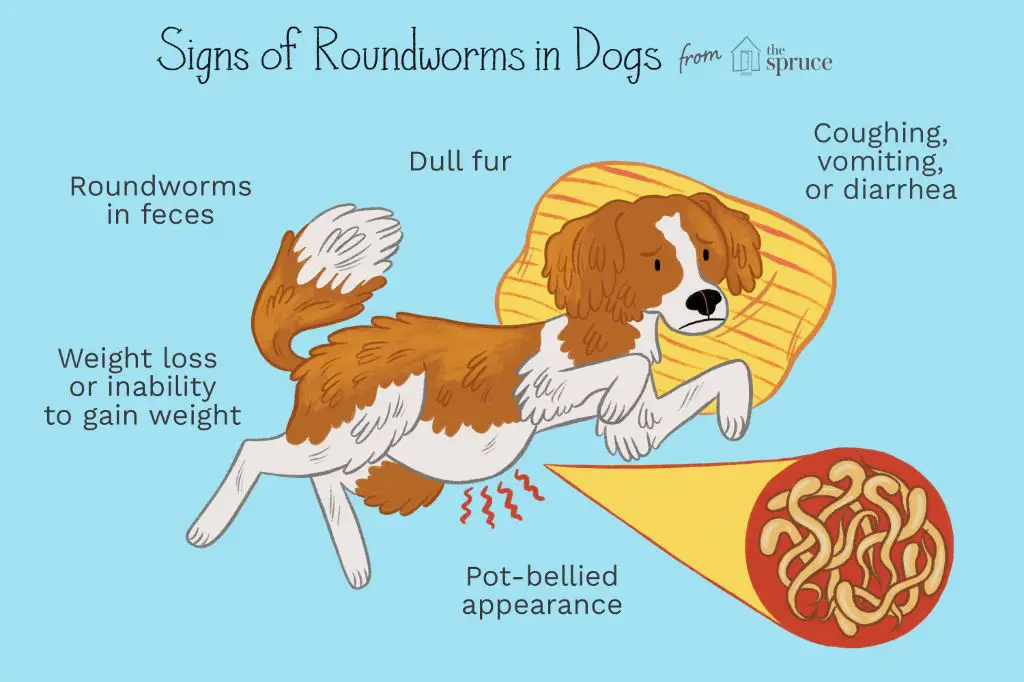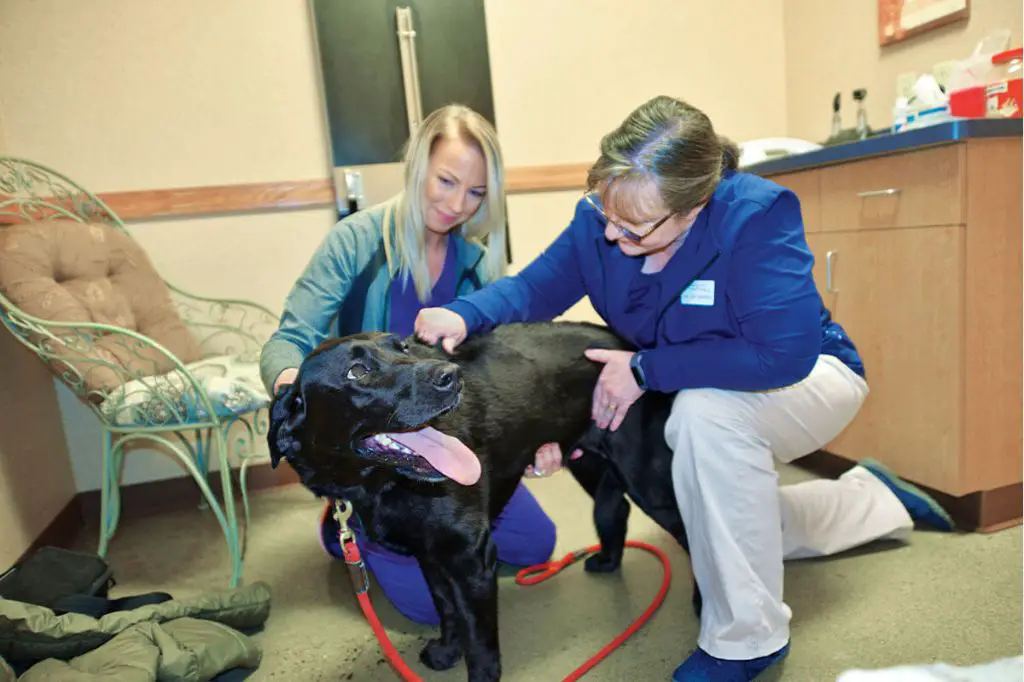Introduction to Parasites in Dogs that can Infect Humans
Parasites in dogs that can spread to humans are organisms that live by obtaining nutrients from another living host at the expense of that host. Dogs can become infected with intestinal worms, protozoa, and other parasites that may not cause illness in the dog, but can accidentally be transmitted to humans through contact with the dog or the dog’s feces.
Certain parasites like roundworms, hookworms, and giardia are prevalent in the canine population with over 10% of dogs shedding parasite eggs in their feces. While proper hygiene and treatment can prevent and eliminate parasites in dogs, there remains a risk of zoonotic (animal to human) transmission if precautions are not taken.
Common Parasites in Dogs That Can Infect Humans
There are several parasites found in dogs that can be transmitted to humans and cause illness. The most common include:

Toxocara
Toxocara canis and Toxocara cati are intestinal roundworms that live in the intestines of dogs and cats. The eggs are shed in the feces of infected animals. Humans can accidentally ingest infective eggs, often by contacting contaminated soil.
Ancylostoma
Ancylostoma braziliense and Ancylostoma caninum are species of hookworms that live in the small intestine of dogs and cats. The larvae can burrow into human skin when in contact with contaminated soil or sand.
Dipylidium
Dipylidium caninum is a tapeworm that lives in the intestine of dogs, cats and other animals. Humans can become infected by accidentally ingesting infected fleas.
Giardia
Giardia duodenalis (also known as Giardia intestinalis or Giardia lamblia) is a microscopic parasite that can infect the intestines of humans, dogs, and cats. Humans can become infected through contact with contaminated soil or water.
Life Cycle and Transmission
Dogs can spread certain parasites to humans through their feces or via fleas and ticks. These parasites have life cycles that allow them to survive and reproduce in both canine and human hosts.
Many intestinal parasites shed microscopic eggs in a dog’s feces. If a human ingests these parasite eggs, either through direct contact with dog feces or contact with contaminated soil, food or water, the eggs can hatch inside the human and mature into adult worms that take up residence in the intestines.
Some common intestinal parasites spread this way include roundworms, hookworms, whipworms and giardia. The microscopic eggs are extremely resilient and can persist in the environment for long periods.
Fleas and ticks can also transmit dog parasites to humans through bites. Fleas pass on tapeworm larvae, while ticks transmit several pathogens including Babesia, Ehrlichia, Anaplasma, Rocky Mountain Spotted Fever and Lyme disease. These parasites and bacteria reside in the tick’s body and enter the human bloodstream when the tick bites.
Dogs serves as reservoirs for these parasites and flea/tick-borne diseases. So regular flea, tick and worm prevention is crucial to break the life cycle and prevent transmission to humans.
Symptoms in Humans
When parasites from dogs infect humans, the most common symptoms are gastrointestinal issues like nausea, vomiting, diarrhea, fatigue, and weight loss. However, the specific symptoms depend on the type of parasite. Here are some of the most common symptoms of different dog parasites in humans:

Gastrointestinal Symptoms
Parasitic infections in humans often lead to gastrointestinal distress. Symptoms may include:
- Nausea and vomiting
- Diarrhea or bloody diarrhea
- Abdominal pain and cramping
- Gas and bloating
- Malabsorption of nutrients leading to weight loss
- Extreme hunger even after eating
Skin Symptoms
Some parasitic infections cause rashes or skin irritation such as:
- Itchy rashes or hives
- Skin nodules or lesions
Respiratory and Flu-like Symptoms
Parasites can also lead to respiratory issues like:
- Cough
- Wheezing
- Fever
- Body aches
- Fatigue
Diagnosis
Diagnosing a parasitic infection from dogs in humans begins with a medical history and physical exam by a doctor. The doctor will ask about exposure to dogs, any recent travel, consumption of undercooked meat, and symptoms.

The main diagnostic test is an examination of stool samples under a microscope to look for parasite eggs, larvae or adult worms. Samples may need to be examined multiple times, since parasites can be shed intermittently. The doctor may use special stains or solutions to help identify certain parasites.
Blood tests can help diagnose some parasitic infections and look for indicators like eosinophilia (increased eosinophils). Imaging tests like X-rays or CT scans may also be used to look for signs of infection.
The specific parasite involved often can’t be identified through microscopic analysis alone. Molecular tests like PCR may be required to determine the exact species. This helps determine appropriate treatment.
Treatment
Treatment for parasite infections involves medications that kill parasites. Common medications include:
- Albendazole – This medication is used to treat a variety of worm infections. It works by keeping the worm from absorbing sugar, which causes its energy depletion and death.
- Mebendazole – This medication kills worms by blocking their ability to absorb nutrients. It is used to treat hookworms, roundworms, whipworms, and other intestinal worm infections.
- Ivermectin – Ivermectin belongs to a class of drugs called antihelmintics, which paralyze and kill parasites. It is used to treat infections caused by roundworms, threadworms, and other parasites.
The specific medication prescribed will depend on the type of parasite infection. The dosage and length of treatment is determined based on factors like the parasite species, infection severity, and the person’s health profile.
In some cases, multiple medications may be used together to effectively eliminate the parasite infection. It’s important to take the full course of prescribed treatment to kill off all parasites and prevent recurrence.
Prevention
There are several ways to help prevent transmission of parasites from dogs to humans:
Proper Handwashing

Wash your hands with soap and warm water after touching dogs, cleaning up after dogs, or handling dog feces or urine. Scrub for at least 20 seconds, cleaning under fingernails and between fingers. Hand sanitizers are not effective at killing some parasites.
Deworming Dogs
Have your veterinarian test your dog’s stool annually and deworm as needed. Puppies should be dewormed starting at 2 weeks old, then every 2 weeks until 12 weeks old. Adult dogs should be dewormed at least 1-4 times per year based on risk factors.
Flea/Tick Control
Use monthly flea/tick prevention medications prescribed by your veterinarian to control external parasites that may transmit diseases. Also treat your home and yard to control fleas and ticks.
Risk Factors
Certain people are at higher risk of contracting zoonotic parasites from dogs. These include:
Young children – Young children often play with dogs and might accidentally ingest infected dirt or feces from handling their pet. Good hygiene and supervision of children around dogs can help reduce risks.
Immunocompromised individuals – Those with weakened immune systems due to disease or medications like chemotherapy have a harder time fighting off infections. Parasites that normally don’t affect healthy individuals could cause illness.
Contact with fleas or feces – Fleas can transmit tapeworms and roundworms. Cleaning up after dogs and using flea control reduces exposure to infected feces and fleas. Wearing gloves while gardening where dogs go to the bathroom can help too.
Complications
Certain parasitic infections from dogs can lead to serious complications if left untreated. Some potential complications include:
Vision Loss
Some parasites like toxocara can migrate to the eye and cause inflammation, scarring, and potentially permanent vision loss or blindness. Ocular larva migrans is a condition caused by toxocara larvae infecting the eye.
Organ Damage
Parasites that affect the internal organs can cause severe and sometimes irreversible damage. For example, cysts from echinococcus can form in organs like the liver, lungs, and brain. Without treatment, the cysts can rupture and be life threatening.
Neurological Problems
Parasites like toxoplasma and neospora can infect the brain and spinal cord, leading to neurological symptoms like headaches, seizures, confusion, and loss of coordination.
Prompt diagnosis and treatment is crucial for preventing permanent organ damage and other serious complications of zoonotic parasitic infections acquired from dogs.
When to See a Doctor
It’s important to treat parasitic infections promptly to relieve symptoms and help prevent complications. If home treatment and deworming medicines don’t resolve symptoms, see your doctor for evaluation and possible prescription drugs.
Consult a doctor right away if you experience any of the following:
- Severe symptoms like vomiting, diarrhea, dehydration, weakness, or rapid weight loss
- Symptoms that persist for more than a few days after deworming your dog
- Symptoms that worsen or become severe despite treatment
- Abdominal pain, distension, or tenderness
- Blood or mucus in stool
- Fever over 101°F (38.3°C)
- Flu-like symptoms like headache, muscle aches, or fatigue
- Eye inflammation or vision changes
Pregnant women with potential parasitic infections should also speak with their doctor promptly. Some parasites can be transmitted to the fetus and cause health problems. If you have a weakened immune system, seek medical care right away at the first signs of infection.
Prompt diagnosis and prescription treatment is key for severe cases or high-risk individuals. With proper care, most parasitic infections can be resolved without complications.